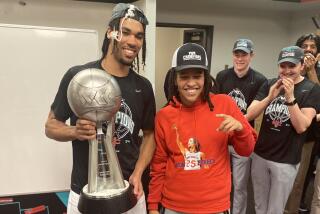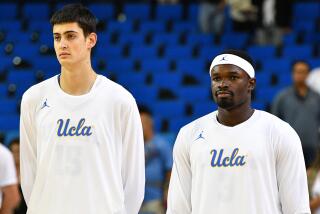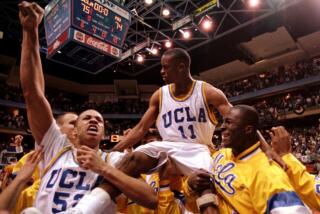He reached great heights, kept his head out of clouds
- Share via
As unbelievable as it might sound, the story of Mark Eaton’s improbable rise from auto mechanic to end-of-the-bench UCLA scrub to NBA All-Star with the Utah Jazz is not a tall tale, even though the protagonist stands 7 feet 4.
It’s an inspirational saga worthy of a movie, says independent filmmaker Stacy Dymalski, who optioned the rights last fall and is writing a screenplay.
“I think it’s a great story to tell and that’s why I wanted to tell it,” Dymalski said from Park City, Utah, where Eaton also lives. “I think it will appeal to people who would like to think they wouldn’t give up on themselves.”
As a teenager in Westminster, Eaton was 7 feet tall “and yet,” Dymalski notes, “he felt so small and insecure and shy. Everybody looked at him like, ‘You must get everything you want because you’re so big,’ and yet he got nothing.”
Eaton, 50, would seem to have it all these days.
After retiring from the NBA in 1993 after 11 seasons as a defense-minded, lane-clogging starting center for the Jazz, the two-time NBA defensive player of the year worked eight seasons as a Jazz broadcaster. He was host of a TV show focusing on jazz -- the musical genre, not the team. An avid skier and fisherman, he was host of another TV show focusing on the outdoors.
A husband and father of two teenage boys, neither of whom is taller than 6-2 and neither of whom plays basketball, he is a managing partner in two award-winning Salt Lake City restaurants and for 14 years spearheaded a nonprofit that served as host of camps for at-risk youth in Salt Lake City and Ogden, Utah.
“You never think your own story is all that interesting, or that it would be worthy of a movie,” Eaton says, “but it’s definitely unique.”
Eaton launched yet another career as a motivational speaker about 1 1/2 years ago, and when he enlisted Dymalski to help polish his prose -- the two had met through mutual friends -- the filmmaker was intrigued by his back story.
Or, as Dymalski came to view it, the heart of her movie.
She says it will pick up in Eaton’s senior year at Westminster High, where he was a 6-11 water polo goalie before the basketball coach talked him out of the pool and onto the end of his bench. A frustrated Eaton rarely left his seat.
“I was growing, I was uncoordinated, and I don’t think the coaches knew what to do with me,” he says. “Teaching big-guy basketball requires different teaching abilities than teaching a guard how to run a play. The coaches didn’t know how to teach me to play big, and I didn’t know how to play big.”
Figuring his basketball career was over at that point, Eaton enrolled at the Arizona Automotive Institute in Glendale, Ariz., graduating as an automotive service technician. Returning to Orange County, he took a job as a mechanic in a tire and auto body shop specializing in brakes, front ends and tuneups.
He might still be there -- “I think I aspired to be a manager,” he says -- if not for happenstance. One day a Cypress College assistant basketball coach named Tom Lubin drove past and noticed a mechanic towering over a customer.
Lubin, whose uncle Frank Lubin (nicknamed Frankenstein) played for the U.S. Olympic basketball team in the 1936 Olympics, eventually talked the now 7-4 Eaton into giving basketball another try. Eaton played two seasons at Cypress, working untold hours in the gym with his tireless mentor and helping the Chargers win a state championship in 1980. UCLA awarded him a scholarship.
His Bruins career, however, was a near-repeat of his high school experience. He played only 41 minutes as a senior and was left off the traveling squad for the season’s final trip. He resigned himself to a life of grease under his nails.
But Lubin wouldn’t give up.
“He could see something in me that I couldn’t see in myself,” Eaton says. “He could look a little further beyond my view and see the possibilities. He probably had his doubts whether I could make it in the NBA, but at the same time he made that commitment to be there for me every day. That’s such a rare thing these days, where you’ll have a coach or a mentor that will make that kind of commitment, that just sees something in you and ... won’t let you fail.”
Lobbied by Lubin, the Jazz rolled the dice and selected Eaton in the fourth round of the 1982 draft, drawing on the basketball adage, “You can’t teach height.”
Then-Jazz coach Frank Layden took it a step further, throwing Eaton into the starting lineup midway through his rookie season just to see what would happen. Eaton continued working on his strength and agility, developed an uncanny ability to block shots and remained a fixture in the starting lineup for the next 10 years. He was selected to play in the All-Star game in 1989, and he appeared in more games for the Jazz than anyone other than John Stockton and Karl Malone.
The Jazz, which earned its blue-collar reputation because of players such as Eaton, paid him the ultimate compliment in 1996, retiring the No. 53 worn by a player who averaged 6.0 points, 7.9 rebounds and 3.5 blocks.
“It’s a remarkable story when you look back on it,” Eaton admits, “but it’s hard for me to really be objective because it’s just what happened to me.
“It was just a series of events that fell into place.”
And, thanks to Dymalski, it’s coming soon to a theater near you.


